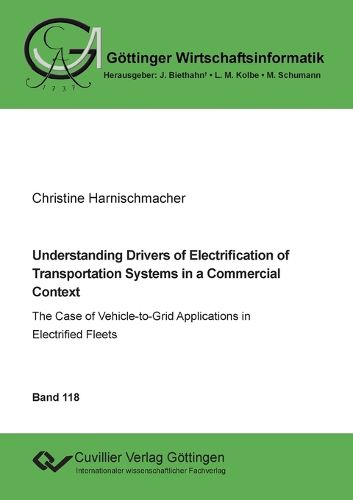Readings Newsletter
Become a Readings Member to make your shopping experience even easier.
Sign in or sign up for free!
You’re not far away from qualifying for FREE standard shipping within Australia
You’ve qualified for FREE standard shipping within Australia
The cart is loading…






The mitigation of global climate change poses one of the major challenges of the twenty-first century. Governments all around the world have set ambitious climate- and energy- specific targets that shape the development of the energy and transportation sectors. Increasing the share of renewable energies in the energy mix and substituting conventional vehicles with electric vehicles (EVs) at the same time poses significant challenges for the power grid. The coupling of the energy and transportation sectors offers a promising increase in energy efficiency, as the EVs' batteries can be used as storage for the provision of utility services by supplying power to the grid for stabilization. This is known as the vehicle-to-grid (V2G) application. Thus, suitable V2G applications can contribute to the security of energy supply while at the same time promoting electrified transportation and the integration of renewables. These applications are especially efficient in a commercial context, where the capacities of several batteries can easily be aggregated. This thesis investigates the role of IS for the electrification and V2G integration of commercial fleets. Four studies were conducted and are compiled in this dissertation that demonstrate the feasibility and provide guidelines for incorporating commercial electrified fleets as an active component of the energy economic value chain. The understanding gained enables viewing fleet electrification and V2G integration as IS enabled amplification of the energy economic value chain towards ecological sustainability.
$9.00 standard shipping within Australia
FREE standard shipping within Australia for orders over $100.00
Express & International shipping calculated at checkout
The mitigation of global climate change poses one of the major challenges of the twenty-first century. Governments all around the world have set ambitious climate- and energy- specific targets that shape the development of the energy and transportation sectors. Increasing the share of renewable energies in the energy mix and substituting conventional vehicles with electric vehicles (EVs) at the same time poses significant challenges for the power grid. The coupling of the energy and transportation sectors offers a promising increase in energy efficiency, as the EVs' batteries can be used as storage for the provision of utility services by supplying power to the grid for stabilization. This is known as the vehicle-to-grid (V2G) application. Thus, suitable V2G applications can contribute to the security of energy supply while at the same time promoting electrified transportation and the integration of renewables. These applications are especially efficient in a commercial context, where the capacities of several batteries can easily be aggregated. This thesis investigates the role of IS for the electrification and V2G integration of commercial fleets. Four studies were conducted and are compiled in this dissertation that demonstrate the feasibility and provide guidelines for incorporating commercial electrified fleets as an active component of the energy economic value chain. The understanding gained enables viewing fleet electrification and V2G integration as IS enabled amplification of the energy economic value chain towards ecological sustainability.